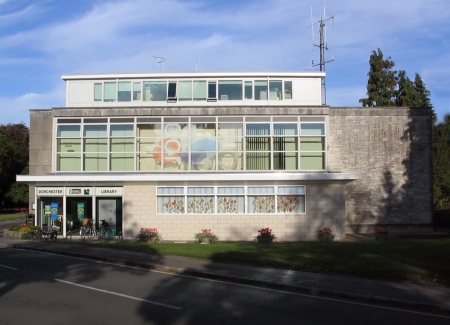Henry Reed graduated from the University of Birmingham in 1936 at the age of 22, with a Master of Arts degree. At the time, he was the university's youngest MA.
Reed's (147-page) thesis was on "The Early Life and Works of Thomas Hardy, 1840-1878" (library catalog), a copy of which now resides in the Thomas Hardy Collection of the Dorchester Reference Library, Dorset:
Dorchester's Hardy Collection contains 'nearly 1,000 theses for higher degrees in typescript or microform,' as well as critical articles from various literary journals.
It would seem likely that the University of Birmingham still has a copy of Reed's thesis, but if they do, they don't seem to have cataloged it.
|
Reed's Hardy Thesis
Thomas Hardy TVReed's freelance career with the BBC was more or less over before the demise of the Third Programme in 1970, and he would produce only a handful of translations for broadcast in the following years. Part of the problem was his reluctance, or inability, to adapt to the new medium of television. He had a disastrous experience working with the director Ken Russell on a film about the composer Richard Strauss in 1969-70. This is widely regarded as Reed's only foray into television.
I found a surprising story today in Sean Day-Lewis's memoir of his father, C. Day-Lewis: An English Literary Life (London: Weidenfeld and Nicolson, 1980), which proves Reed dared to delve into television at least one time, previously. In 1963, Reed had a run-in in Dorset with his friend and fellow poet Cecil Day-Lewis, when both men were working on rival Thomas Hardy projects for TV: Earlier that summer Cecil had done his work as commentator on a short film about Thomas Hardy made by David Jones for the bbc Television arts programme Monitor. He had said some of his piece at the Upper Bockhampton cottage, near Dorchester, where Hardy was born in 1840. By chance, the poet Henry Reed, the source of so many of the jokes on which Cecil dined out, was at the same time making a Hardy programme for Southern Television. Between them they built this coincidence up into a hilarious anecdote which had the lane jammed with outside broadcasting units, a sea of crossed wires and cross technicians, and the two poets shouting infuriated insults to each other, Cecil ponitificating indoors, and Reed holding forth in the garden. Whatever the difficulties, the bbc film was completed and broadcast at the end of November (p. 254). Can't you hear the two men pouring derision at each other, playing it up for the cameras and crew? "Day-Lewis, you hack! Are you going to spend all day in there?" "We'll be through when we're through, Reed! You has-been!" That's a lovely compliment about Day-Lewis retelling Reed's jokes, too. And here's a bit of film-and-tv trivia for you: the actress Kika Markham played Tess in the BBC's film (click on "reveal extra detail"). I recognize her from her cameo as Sean Connery's wife in the 1981 movie, Outland.
AntelopesI walked downtown yesterday, chiefly for exercise, but also to while away a few hours at the campus bookstore. It's finally warming up here, after a cool, wet spring. It was a pleasant walk, if a little on the hot side: there's honeysuckle in the woods along the road into town, and the Beds and Breakfasts have all kinds of fragrant, flowering shrubs which are coming into bloom. There are even some late flowers still punctuating the magnolias. (Or are they early?)
I'm trying to put detailed, relevant descriptions with each entry in the bibliography, making searches easier, and references to my hardcopy less necessary. At the bookstore, hogging wireless bandwidth and surping at a giant latte, I spotted a mention, in the Introduction to the Collected Poems, of Reed staying at the Antelope Hotel while he was researching his biography of Thomas Hardy (which he never finished), in 1945 or '46, after his release from the Service. Turns out, there are several Antelope Hotels in the UK. At first, I thought it was this Antelope Hotel, in Sherbourne, Dorset. Dorset is Hardy country. But the Introduction specifically mentions Dorchester, and both Hardy's cottage and his estate, Max Gate, are closer to that city. Perhaps this Antelope Hotel in Poole was the hotel mentioned? Last night, after dinner, I was trying to track down a photograph of the hotel, and discovered there once was, in fact, an Antelope Hotel in Dorchester proper. It's been turned into a shopping arcade. A mall, of all things: The Antelope Walk. A crying shame. In 1685, James Scott, the Duke of Monmouth and illegitimate son of Charles II, made a play to overthrow King James II. Following the defeat of the Duke's forces at the Battle of Sedgemoor, participants in the Monmouth Rebellion were rounded up and tried for treason. The "Bloody Assizes" (trials) were presided over by the Chief Justice of the King's Bench, better known as "Hanging Judge" Jeffreys, for his ruthlessness in currying favor from the Crown. The Bloody Assizes were held in the Oak Room of the Antelope Hotel, Dorchester, in September, 1685. Judge Jeffreys is said to have had a secret passage over the rooftops leading from his lodgings at 6 High Street West (now Judge Jeffreys Restaurant and Steak House. Not kidding.) to the Court. One hundred seventy-five convicted rebels were sentenced to transportation: sold into slavery in the West Indies. Still, this was probably preferable to the fate of the seventy-four men sentenced to death: hanged until dead, drawn and quartered, their heads displayed on pikes in throughout the West Country. Twenty-nine suspected rebels were pardoned. (Judge Jeffreys, by the way, died of kidney disease in the Tower of London, after James II fled England in 1688.) The old Oak Room is still there. It's a tearoom, now.
|
|||||||||||||||||||||||||
|
|
||||||||||||||||||||||||||








